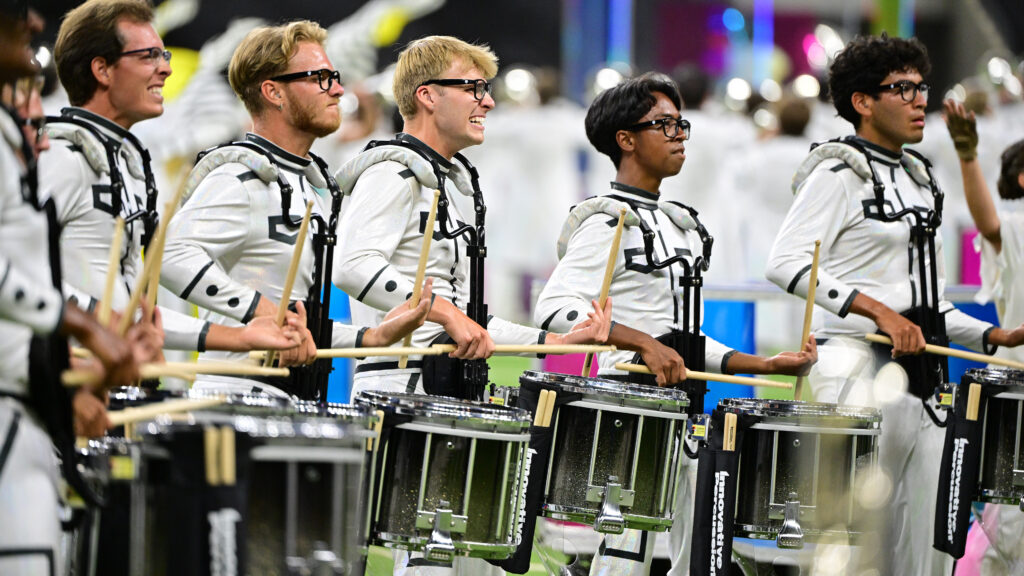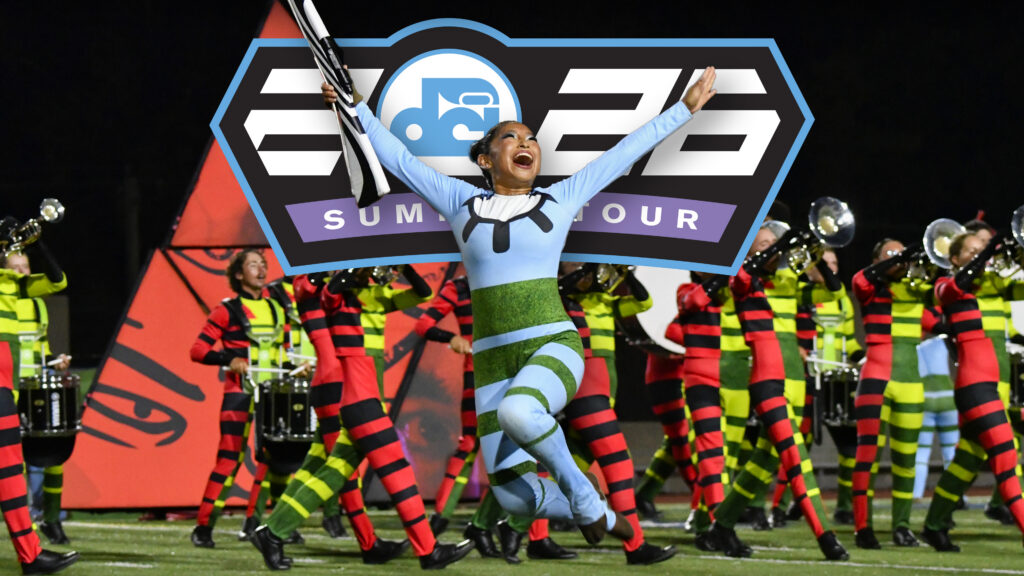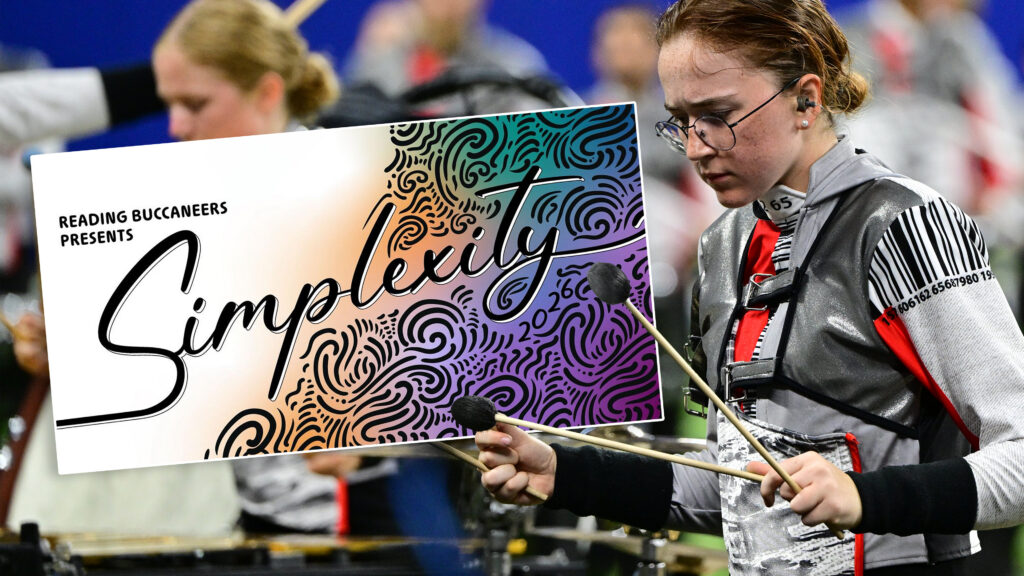James Sholtz contributed the following.
By chance I stumbled across one of your Fanfare articles archived on DCI.org. (“Semper Fi Memories,” Nov. 5, 2004). Boy, did it jog some memories! Let me preface some things. I started playing drum set at age 11. I studied, practiced and played a lot. I moved to Manhattan in the summer of 1973 at the age of 18 and received a diploma from the Institute of Audio Research in studio technology and practice. This involved working the board, mike placement, recording, etc.
The classes were about how to record and engineer records. But I was still a drummer at heart. I was in Bell Sound and Vanguard studios a bit, and they let me record after they heard me play during class downtime. They felt I was a pretty good drummer.
I was actually offered a job at Vanguard, had my foot in the door so to speak. (The job was one of being a gopher, helping around the studio, sitting and learning at the board and getting some good mentoring.) Well, I knew it all then, and knew I needed to go back to Detroit to practice the drums more.
I could have had the best lessons on set from numerous studio drummers in New York if I had stayed, plus I would have had an income. I went back to Michigan and practiced set with various instructors, including a Detroit Symphony percussionist, Motown’s first studio drummer and a phenomenal jazz player.
I was doing technique studies on my own. People in town thought I had fast hands. I did, too. I learned a lot about set and then had the urge to focus solely on technique for a few years. I wondered what to do. I knew several famous drummers had all been service drummers — Buddy Rich, Alan Dawson, Jim Chapin, Billy Cobham, Elvin Jones and Steve Gadd. So, I joined the Marines. During the auditions I said I wanted to be in the drum corps.
I was asked, “Have you ever held rudimental sticks?” I answered honestly, “No.” They wanted me in the band but I wanted to be in the drum corps. They acquiesced and I got what I wanted. Although I had never marched and had studied drum set instead of marching percussion, I was ready to impress those rudimental drummers. After boot camp and a 10-day leave, I went back to Parris Island for the drum and bugle corps school during the summer of 1977.
There were three of us to show up as drum “students” and two instructors. I was ready to impress. Not even being a rudimental drummer, I was “near” the ability of the instructors. The other two “students” showed up and I was still thinking that I’m pretty good. Then Glen Conklin walked in the door and stood next to me at the snare at my left. I never saw anything like it.
I had never marched and had never seen a drum corps show. Glen, who had marched with the Rochester Crusaders, blew the instructors away. Well, I realized then and there that I could not play snare drum. I didn’t know what to think. Glen was convinced that because of his talent he’d be there a week or so before he was transferred to Washington. It didn’t work out that way for Pvt. Conklin.
He was in the Marines and he was a Marine. Other Marines will completely understand. Nevertheless, I was lucky to be playing with him for three months or so. He stayed for that summer and into the fall. I think he just worked on refining his relaxation and practiced playing very low for some three months, 1/8- to ¼-inch off the head.
I drummed and represented the Marine Corps for about two and one-half years after boot camp and drum and bugle corps school. I believe Glen was in for a three-year enlistment. One night we were in the drum room late at night playing and I guess the spirit moved him — Glen was playing a double stroke roll while bringing each hand up to ear level! That drum ROARED! The room was filled with a snare sound I had never heard before.
I was just about in disbelief. Glen was playing fast, too. It was unbelievable. We had some fun other than playing drums. I could read 3 against 4 then, an eighth note rhythm in one hand and various quarter note triplets mixed with eighth note triplets against it.
Glen used to try to make fun of my ability to do that sort of thing. After drum and bugle corps school I was stationed in New Orleans. Once the “act” was down we traveled quite a bit, mostly east of the Mississippi. When we would travel, and when we were in town, we often went to check out the musicians in the area.
I continued to practice for hours daily and did get quite proficient. New Orleans had many distractions for young men in excellent physical condition. On more than one occasion, fellow Marines and I ran into the ire of the NOPD while we were at a bar in the French Quarter. Well, I did right by the NOPD in the future. I treated a few NOPD in New Orleans during my joint residency at Tulane after my stint in medical school and as a physician in town.
And they all lived. As you can gather, I did not continue with music as a career. After the Marines, I played a bit, but marriage and a child on the way engendered much thought regarding what I should do with my future.
I took the easy way out and am currently a neurologist and a psychiatrist, though I still play the drums weekly. I still go to clubs in New Orleans to enjoy good music. (Yes, even post-Katrina.) There are many fine musicians in New Orleans that play for the love of music.
I learned that one’s talent often has no relationship to income earned. These musicians could have much better incomes than what they currently have. I state the obvious, I know.
Michael Boo has been involved with drum corps since 1975, when he marched his first of three seasons with the Cavaliers.
He has a bachelor’s degree in music education and a master’s degree in music theory and composition.
He has written about the drum corps activity for over a quarter century for publications such as Drum Corps World, and presently is involved in a variety of projects for Drum Corps International, including souvenir program books, CD liner notes, DCI Update and Web articles, and other endeavors. Michael currently writes music for a variety of idioms, is a church handbell and vocal choir director, an assistant director of a community band, and a licensed Realtor in the state of Indiana. His other writing projects are for numerous publications, and he has published an honors-winning book on the history of figure skating.
His hobbies include TaeKwonDo and hiking the Indiana Dunes. But more than anything, Michael is proud to love drum corps and to be a part of the activity in some small way, chronicling various facets of each season for the enjoyment of others.





